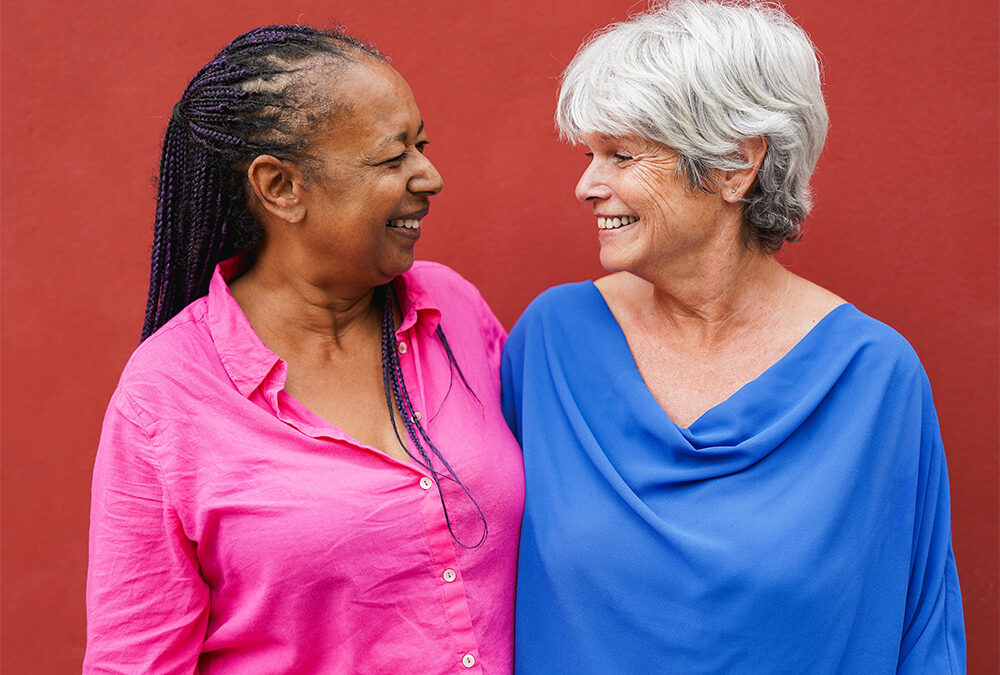As Americans of all backgrounds continue to live longer, it is important to ensure that elder care meets the needs of all older individuals. LGBTQ+ individuals are 4 times less likely than their heterosexual peers to have children to aid in their care. This is one of many reasons that LGBTQ elders are more likely to rely on professional caregivers for support. According to a study by the University of Washington in 2017, the number of aging adults who identify as LGBTQ is steadily growing. As a result, queer-sensitive elder care will be needed more than ever. Below, we will discuss this growing demographic and how caregiving services must rise to meet the needs of this aging population.
Training Caregivers for Queer-Sensitive Elder Care
What does queer-sensitive elder care look like? Overall, it isn’t much different than elder care for cisgender and heterosexual individuals. Mainly, it is about preparing caregivers not to make assumptions about their clients. Additionally, it is training to make sure that you are meeting individuals where their needs are. As stated above, queer individuals are less likely to have assistance from younger generations in their family. There may also be more signs of social isolation from extended family members. Queer-sensitive training is also important for first introductions between caregivers and clients. Establishing pronouns can be a small addition to client intake, but it can go a long way in supporting LGBTQ+ clients.
Queer-Sensitive Care and Unique Challenges
Studies show that LGBTQ elders are more likely to be socially isolated than their peers. Between a lack of support from family, social isolation among peer groups, isolation, and worse overall mental health are common.
While HIV and AIDS outcomes are improving in the US, more people with these conditions are living longer, fuller lives. With over 1.2 million individuals in the US living with HIV, the majority of cases are still found among LGBTQ+ individuals. Having professional caregivers understand the unique care needs of autoimmune conditions, such as HIV and AIDS, can be vital to supporting aging individuals.
“LGBT” vs “LGBTQ” in Elder Communities
For many older LGBTQ individuals, the term “queer” holds much more negative connotations than it does today. While this will likely continue to shift, it is unimportant to address. For many older LGBT individuals, “queer” is likely associated heavily with hate. Younger generations of queer individuals have reclaimed the word, with much success. As we discuss queer-sensitive care for older adults, it can be important to understand the potential negativity around the word. Caregivers and families of LGBTQ individuals should understand that some people may feel negatively about the term.
Finding Queer-Sensitive Health Services
Unfortunately, not every healthcare provider accepts those of different backgrounds. Only some elder care providers ensure that their aides and nurses will treat all of their clients with the respect they deserve. When looking into senior care, look for companies that are known for working with diverse clientele from different walks of life. Consider asking friends with similar circumstances for referrals to LGBTQ+ affirming healthcare and service providers. You can also look for recommendations from LGBTQ+ non-profits or support organizations.
Advocating for Queer-Sensitive Elder Care
When researching care support for yourself or an older family member, consider looking for services that accommodate and support queer individuals. Whether looking for in-home aides, nursing services, or other accommodations, it is important to find supportive care that is inclusive.
Housing and Accommodation Laws for LGBTQ+ Elders
In many states, housing accommodation equality is not guaranteed for LGBTQ+ individuals. According to the Movement Advancement Project, only 22 states currently have explicit laws that prohibit housing discrimination based on sexual orientation and gender identity. Concerningly, our article last year regarding LGBTQ care also cited the MAP, but then 23 states prohibited housing discrimination based on sexual orientation or gender identity. Overall, this means that these rights are in danger for some individuals. Thankfully, New York is one of the states that still ensures this safety. However, only about 49% of LGBTQ+ individuals in the country live in states protected by these housing laws.
Resources for LGBTQ+ Elders in New York
Safe Harbor Healthcare Services is lucky to operate in one of the most supportive states for LGBTQ+ elders. SAGE is a national resource center for aging LGBTQ+ individuals. They have a page dedicated to resources for those living in New York, as well as a network of support centers here in New York City. Every borough in NYC has community-focused care resources for LGBTQ+ individuals. Staten Islanders can also find resources at their local Pride Center.
Queer-Sensitive In-Home Care With Safe Harbor
At Safe Harbor Healthcare Services, we provide certified home health aides and nursing care to elders and individuals with disabilities in Staten Island. We are proud to provide support to a diverse group of people in our community.
Safe Harbor Healthcare Services does not provide medical, healthcare, or financial advice via articles. This material has been prepared for informational purposes only. It is not intended to provide and should not be relied on for advice.
Safe Harbor Healthcare Services has provided excellent home care on Staten Island since 1967. Our services help older and disabled individuals live safely and independently while giving their families the peace of mind they need. For more information, contact us or call (718)-979-6900.

